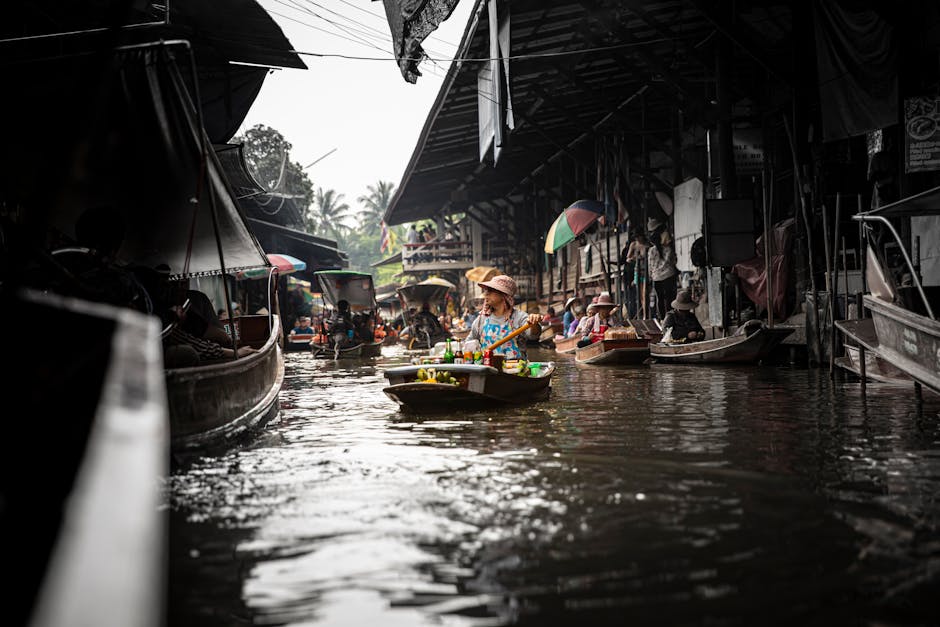Floating Markets of Thailand: A Unique Shopping Experience You Won't Forget

Floating Markets of Thailand: A Unique Shopping Experience You Won't Forget
Hey there, fellow traveler! Ever dreamt of a shopping experience that's not just about buying things, but about immersing yourself in a vibrant culture, surrounded by delicious smells and the gentle rocking of a boat? If so, then the floating markets of Thailand are calling your name! I'm going to share my personal experiences and insights into these magical places, and why I think they're an absolute must-see.
What Exactly Are Floating Markets?

Imagine a bustling waterway, teeming with longtail boats laden with fresh produce, fragrant flowers, handmade crafts, and sizzling street food. That, in a nutshell, is a floating market. Historically, these markets were vital trading hubs for communities living along Thailand's rivers and canals. Back then, water was the primary mode of transportation, so selling goods directly from boats made perfect sense. While land-based markets have become more prevalent, the floating markets have persisted, evolving into captivating tourist attractions that offer a glimpse into Thailand's rich history and culture.
Think of it as a watery farmers market, a delicious food court on the move, and a vibrant cultural showcase all rolled into one. It's an assault on the senses in the best possible way – the sights, the sounds, the smells, the tastes... it's an unforgettable experience!
Why Visit a Floating Market? It's More Than Just Shopping!

Okay, so maybe you're not the biggest shopper in the world. That's totally fine! Even if bargaining for souvenirs isn't your thing, I promise you'll find something to love about the floating markets. Here's why:
- Authentic Cultural Immersion: Forget sterile shopping malls. At a floating market, you're interacting directly with local vendors, seeing how they live and trade. It's a genuine glimpse into Thai culture that you won't find anywhere else. You'll hear snippets of Thai conversations, see families working together, and get a real feel for the local way of life.
- Mouthwatering Food Adventures: The floating markets are a food lover's paradise. From freshly grilled seafood and flavorful noodle soups to exotic fruits and sweet treats, there's something to satisfy every craving. And the best part? It's all cooked right in front of you, often on the boats themselves! I still dream about the mango sticky rice I had at Damnoen Saduak – the best I've ever tasted!
- Unique Photo Opportunities: Trust me, you'll want to have your camera ready. The vibrant colors of the boats, the exotic produce on display, and the friendly faces of the vendors make for incredible photographs. It's a photographer's dream come true, whether you're a seasoned pro or just snapping pictures with your phone.
- The Thrill of the Ride: Navigating the crowded waterways in a longtail boat is an adventure in itself. It's a chance to see the market from a unique perspective, and to feel the energy of the place swirling around you. Just be prepared for a bit of bumping and splashing – it's all part of the fun!
Popular Floating Markets in Thailand: Choose Your Adventure!

Thailand boasts several amazing floating markets, each with its own unique charm and character. Here are a few of the most popular, along with my personal thoughts:
1. Damnoen Saduak Floating Market: The Classic Experience
Damnoen Saduak is probably the most famous floating market in Thailand, and for good reason. It's vibrant, bustling, and offers a truly immersive experience. Be prepared for crowds, especially during peak season, but don't let that deter you. The energy of the place is electric! I remember feeling a little overwhelmed at first, but once I hopped into a boat and started navigating the canals, I was hooked. The sheer variety of goods on offer is astounding, and the photo opportunities are endless.
My tip: Go early in the morning to avoid the biggest crowds and the hottest sun. And don't be afraid to haggle – it's all part of the experience!
2. Amphawa Floating Market: Evening Delights
Unlike most other floating markets that operate in the mornings, Amphawa comes alive in the late afternoon and evening. This makes it a great option if you prefer a more relaxed atmosphere and want to avoid the midday heat. Amphawa has a more local feel than Damnoen Saduak, and it's a popular spot for Thai families to spend the weekend. The food scene here is fantastic, with an emphasis on fresh seafood grilled right on the boats. Plus, the firefly boat tours that operate in the evening are truly magical.
My tip: Try the grilled seafood – it's incredibly fresh and flavorful. And be sure to stick around for the firefly tour – it's an unforgettable experience!
3. Khlong Lat Mayom Floating Market: A Local Favorite
If you're looking for a more authentic and less touristy experience, Khlong Lat Mayom is an excellent choice. Located closer to Bangkok than Damnoen Saduak or Amphawa, this market is popular with locals and offers a glimpse into everyday Thai life. The food here is delicious and incredibly affordable, and the atmosphere is relaxed and friendly. You'll find a wider range of local dishes and produce than at the more tourist-oriented markets.
My tip: Come hungry! The food stalls here are amazing, and the prices are incredibly reasonable. Try the boat noodles – they're a local specialty!
4. Taling Chan Floating Market: Weekend Fun
Taling Chan is another smaller, more local floating market that's perfect for a weekend outing. It's located relatively close to Bangkok, making it easily accessible for a day trip. This market has a relaxed and friendly atmosphere, with a focus on fresh food and local crafts. You can even get a traditional Thai massage right by the water!
My tip: Try the fresh seafood and don't miss the opportunity to get a relaxing Thai massage!
Tips for a Smooth Floating Market Experience

Okay, now that you're itching to go, here are some tips to help you make the most of your floating market adventure:
- Go Early: This is especially important for Damnoen Saduak. The earlier you arrive, the fewer crowds you'll encounter, and the cooler the weather will be.
- Dress Appropriately: Wear comfortable shoes and lightweight clothing. It can get hot and humid, so breathable fabrics are a must. Also, consider wearing a hat and sunglasses to protect yourself from the sun.
- Bring Cash: Most vendors only accept cash, so be sure to have plenty of Thai Baht on hand. Smaller denominations are always helpful.
- Haggle Respectfully: Bargaining is expected, but do it with a smile and be respectful of the vendors. A little friendly banter can go a long way.
- Be Adventurous with Food: Don't be afraid to try new things! The floating markets are a great place to sample a wide variety of Thai cuisine. Just be sure to choose stalls that look clean and well-maintained.
- Stay Hydrated: Drink plenty of water throughout the day to stay hydrated, especially if you're visiting during the hotter months.
- Watch Out for Pickpockets: As with any crowded tourist destination, be aware of your surroundings and keep your valuables safe.
- Learn a Few Basic Thai Phrases: Even a few simple phrases like "Sawasdee" (hello) and "Khop Khun" (thank you) can go a long way in showing respect and making a connection with the locals.
- Hire a Boat: The best way to experience the floating markets is by hiring a longtail boat. You can usually negotiate the price with the boat operator.
What to Buy at a Floating Market?

So, what can you actually buy at a floating market? Here's a glimpse into the treasures you might find:
- Fresh Produce: From colorful fruits and vegetables to fragrant herbs and spices, the floating markets are overflowing with fresh, locally grown produce.
- Handmade Crafts: You'll find a wide variety of handmade crafts, including wood carvings, silk scarves, pottery, and jewelry. These make for unique and memorable souvenirs.
- Clothing and Accessories: Many vendors sell clothing, accessories, and textiles. Look for traditional Thai designs and fabrics.
- Souvenirs: Of course, you'll find plenty of souvenirs, from small trinkets to larger, more elaborate items. Remember to haggle for the best price!
- Local Snacks and Sweets: The floating markets are a great place to sample local snacks and sweets. Look for traditional Thai desserts like mango sticky rice, khanom krok (coconut pancakes), and luk chup (fruit-shaped marzipan).
Getting There: Planning Your Trip

Getting to the floating markets can be an adventure in itself! Here are a few transportation options:
- Taxi or Private Car: This is the most convenient option, especially if you're traveling with a group. You can hire a taxi or private car from Bangkok to most of the popular floating markets.
- Bus: Public buses are a more affordable option, but they can be slower and less comfortable. You can catch a bus from Bangkok's Southern Bus Terminal (Sai Tai Mai) to destinations near the floating markets.
- Organized Tour: Joining an organized tour is a hassle-free way to visit the floating markets. Tours typically include transportation, a boat ride, and a guided tour of the market.
Important Note: Traffic in Bangkok can be unpredictable, so be sure to factor in extra travel time, especially if you're traveling during peak hours.
My Lasting Memories

My trips to the floating markets of Thailand are some of my most cherished travel memories. The vibrant atmosphere, the delicious food, and the friendly people made for an unforgettable experience. I remember the thrill of navigating the crowded waterways in a longtail boat, the tantalizing aroma of grilled seafood, and the warm smiles of the vendors. These are the moments that stay with you long after you've returned home.
Beyond the Tourist Trail

While the popular floating markets like Damnoen Saduak and Amphawa are definitely worth visiting, consider venturing off the beaten path to discover some of the smaller, less touristy markets. These hidden gems offer a more authentic and intimate glimpse into Thai culture.
Sustainable Tourism: A Few Considerations

As tourism continues to grow, it's important to travel responsibly and minimize our impact on the environment and local communities. Here are a few things to keep in mind when visiting the floating markets:
- Support Local Businesses: Buy your souvenirs and food from local vendors to support the local economy.
- Reduce Waste: Bring your own reusable water bottle and shopping bag to reduce plastic waste.
- Be Respectful of the Culture: Dress modestly and be mindful of local customs and traditions.
- Avoid Single-Use Plastics: Refuse plastic straws, cups, and bags whenever possible.
Final Thoughts: Embrace the Adventure!

Visiting a floating market in Thailand is more than just a shopping trip; it's an adventure for your senses and a window into a captivating culture. So, pack your bags, grab your camera, and prepare to be amazed by the sights, sounds, and flavors of Thailand's unique floating markets. I promise, you won't regret it!
Post a Comment